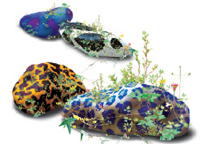|
cordyceps project, 2000
Winter Version Summer of 2001
The Chicken-Egg Problem ÔÏÍ®- ù¾Õ°
-Mimic After The Mimic / Mimic Before The Mimic
|
 |
Transgression of Artist
Assuming that reality (úÞãù) is made up of two aspects of being reveled
(úÞ) and being concealed (ãù), we can say that reality is the composition
of what is seen and what is not. We have a strong longing for and
curiosity about what is not seen or what cannot be seen, but at
the same time, we have a strong resistance against them-a resistance
to the new. It is because, in a real sense, the newness always creates
disruption of epistemology. The newness has two-fold implications,
in that it is desired for as a value but at the same time it invites
defiance out of fear of discontinuation of perception. Transgression
(of the beauty) against the ugliness, transgression (of the ugliness)
against the beauty.
Shedding Works: Transformation in Working Process
I don¡¯t remember exactly when it was, but whenever summer arrives,
I come to deal with water as a motif for my work. These days, I
plant a garden, feeling the soil and water. Just like we long for
forests, mountains and water in summer, so do the materials and
motif of my work. I wander around the forest looking for some plants,
or search the garden, as if rummaging through the bookstore, as
if visiting the atelier. When the sweltering summer arrives, I take
oriental medicine or herbs occasionally.
This offers the relief from the heat, creating the circulation and
reversal of Yin and Yang. As with changing clothes or shedding hair
as season changes, I change my work.
Intersection of the Reality (Revelation úÞ- Concealment ãù) : Cordyceps
Series
This is real (plants are growing), while this is also a simulation
(they do not exist or create an impossible situation). Just like
the udambara (éÐÓ¾÷èÔþ) flower, never seen before, something hidden,
an analogy of imagination through the real or replacing of imagination
with the real, and thereby becoming a representation of intersection
between being and non-being, so can be
neither true nor false, a part of symbolism?
Intersection of Revelation (úÞ) - Concealment (ãù)
As revelation (úÞ) appears, turning to Yang (åÕ), concealment (ãù)
sinks into the shade, turning to Yin (ëä). Cordyceps (ÔÏõùù¾õ®) As the
summer starts in earnest, turning to yang (åÕ), the winter falls
into the shade, turning to yin (ëä). As worms become active, turning
to yang (åÕ), plants turn to yin (ëä). And the worms die, turning
to yin (ëä), the plants grow on the carcass, turning again to yang
(åÕ).
-What is your identity?: What is identity all about? Circulation
of identity, illusion of identity, myth of identity.
What am I yearning for through my work? To me, exhibition is, invariably,
an (self-imposed) opportunity to ponder upon this question. Looking
at each other-resembling each other-mimicking each other (becoming
similar/belonging to each other)-mimicking the mimicry-becoming
a mirror to each other-symmetrical visionreflecting of each other,
like the two chimney boys of the Talmud-reflecting of the reflected-turning
inside out-sharing with each other-symmetry-symmetry of destiny
-symmetry of the mimicry
I am interested in symmetry and ceaseless mimicking of the mimicry
through looking at each other and symmetrical images that repeatedly
representing the represented. This is like conceiving within itself
what is to be represented. And this is where representation comes
before what is represented, and the polar opposite and harmony exist
together. This is what can be found in the zebra pattern-my paper
casting works--, cordyceps---,
2001. myung -seop hong |
|


